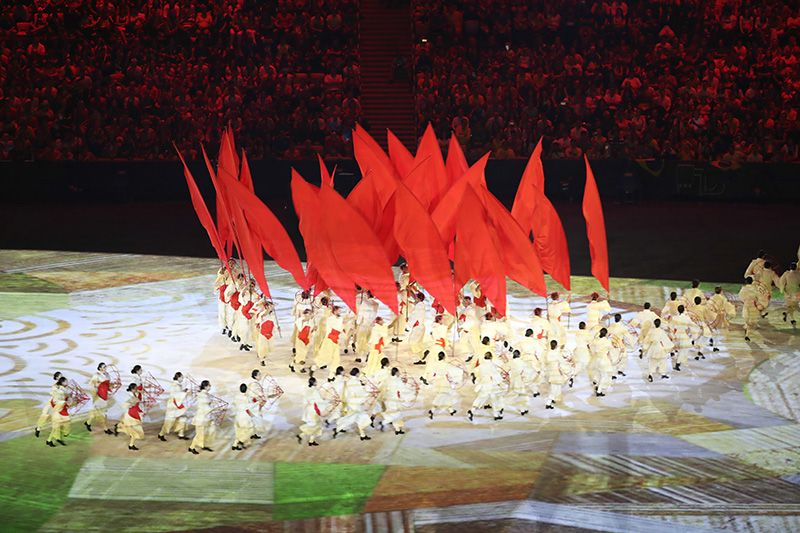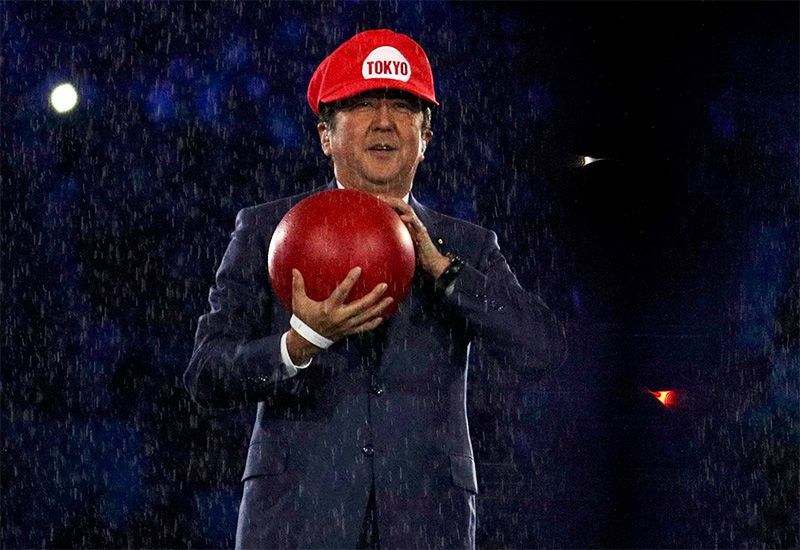Timeline for August 2016
- English
- 日本語
- 简体字
- 繁體字
- Français
- Español
- العربية
- Русский
2
The cabinet approves a ¥28 trillion stimulus package. The supplementary budget includes pay rises for care workers looking after children and the elderly, as well as funding to accelerate the completion of a planned high-speed maglev service between Tokyo and Osaka by up to eight years.
3
Prime Minister Abe Shinzō reshuffles his cabinet. Eight members retain their positions, while new faces include Inada Tomomi as minister of defense and Sekō Hiroshige as minister of economy, trade, and industry.
Related articles:
Abe Reshuffles Cabinet After House of Councillors Election (August 2016)
North Korea launches two mid-range Nodong ballistic missiles, one of which lands in Japan’s exclusive economic zone, 250 kilometers west of Akita Prefecture. As the Japanese government was not able to detect the firing was imminent, it did not give orders to shoot the missiles down. On August 8, the Self-Defense Forces receive orders to be ready to intercept missiles at any time.
At its 129th Session in Rio de Janeiro, the International Olympic Committee agrees to add five new sports to the 2020 Summer Olympics to be held in Tokyo. These are baseball/softball, karate, surfing, skateboarding, and sport climbing.
5
The opening ceremony for the 2016 Summer Olympics is held in Rio de Janeiro. The Japanese delegation features a total of 338 athletes competing in 30 sports; decathlete Ushiro Keisuke bears the flag during the team procession.
 The Olympic opening ceremony performance recounts the history of Brazil, including the arrival of Japanese immigrants in the country. (© Jiji)
The Olympic opening ceremony performance recounts the history of Brazil, including the arrival of Japanese immigrants in the country. (© Jiji)
6
A ceremony is held in Hiroshima marking 71 years since the atomic bombing of the city. Mayor Matsui Kazumi makes reference to the May visit by US President Barack Obama in his speech, urging other world leaders to visit. Nagasaki holds its own memorial ceremony on August 9.
Related articles:
President Obama’s Hiroshima Speech: An Assessment
President Obama Visits Hiroshima: A Selection of Related Content
8
Emperor Akihito expresses his desire to abdicate, stating in a video message: “When I consider that my fitness level is gradually declining, I am worried that it may become difficult for me to carry out my duties as the symbol of the State with my whole being as I have done until now.”
Related articles:
Emperor Akihito Addresses Nation Following Abdication Reports
Abdication: The Emperor’s Wish and Prospects for Its Realization
9
Foreign Minister Kishida Fumio summons Chinese Ambassador Cheng Yonghua to protest against repeated incursions by Chinese vessels into the waters around the Senkaku Islands from August 5. More than 200 vessels, including Chinese Coast Guard ships, entered the contiguous zone outside Japanese territorial waters. On August 11, the Japan Coast Guard rescues six crew members of a Chinese fishing boat that sinks after colliding with a Greek cargo ship.
The Japanese government released a video showing Chinese vessels around the Senkaku Islands.
Related articles:
Making Waves: Chinese Response to the South China Sea Case
Maritime Concerns and the Future of Sino-Japanese Relations
12
Foreign Minister Kishida holds a teleconference call with his South Korean counterpart Yun Byung-se. The two reach broad agreement on the operation of a foundation for supporting former comfort women, based on the agreement between the two countries at the end of 2015. On August 24, the Japanese cabinet decides to donate ¥1 billion to the foundation and both countries agree that each of the surviving women should receive 100 million won (¥10 million).
14
The Johnny & Associates talent agency announces that idol group SMAP, which it manages, will split up on December 31 this year.
15
An official ceremony is held in Tokyo on the anniversary of the end of World War II, commemorating those who died in the conflict. As at last year’s ceremony, Emperor Akihito expresses “deep remorse.”
21
The Summer Olympics comes to an end in Rio de Janeiro. Japan’s athletes take home a record 41 medals (12 gold, 8 silver, and 21 bronze). At the closing ceremony, the flag is passed on to Koike Yuriko, governor of the 2020 host city Tokyo.
 Prime Minister Abe makes international headlines with his surprise appearance as the iconic video game character Mario at the closing ceremony for the Summer Olympics in Rio de Janeiro. (© Reuters/Aflo)
Prime Minister Abe makes international headlines with his surprise appearance as the iconic video game character Mario at the closing ceremony for the Summer Olympics in Rio de Janeiro. (© Reuters/Aflo)
Related articles:
Japan’s 2016 Olympic Medal Winners (Photo Gallery)
Japan’s Olympics: 2016 Medalists and Historic Medal Totals
First Lady Abe Akie posts on Facebook that she visited Pearl Harbor in Hawaii. At a press conference, Chief Cabinet Secretary Suga Yoshihide says that it was a private trip and that Prime Minister Abe has no plans to make an official visit.
In her Facebook post, First Lady Abe writes: “I offered flowers and prayers at the USS Arizona Memorial in Pearl Harbor.”
23
The political party Initiatives from Osaka changes its name in a bid to broaden its appeal beyond the region. The Japanese name for the new party is Nippon Ishin no Kai, the same as that for the party launched by Hashimoto Tōru in 2012.
24
Foreign Minister Kishida holds three-way talks in Tokyo with Wang Yi and Yun Byung-se, the foreign ministers of China and South Korea, in the first such tripartite discussion since March 2015. The three ministers join in urging restraint from North Korea after it launches a missile from a submarine in the early hours of the morning.
26
The Ministry of Internal Affairs and Communications announces that the consumer price index fell by 0.5% in July, year on year. The index, which excludes volatile fresh food prices, dropped for the fifth consecutive month, experiencing its greatest decline in more than three years.
Newly elected Kagoshima Governor Mitazono Satoshi calls on Kyūshū Electric to suspend operation of Sendai Nuclear Power Plant for renewed safety testing, due to increased concerns from citizens following earthquakes in Kumamoto Prefecture. It is currently the only nuclear plant in operation in Japan.
27
Prime Minister Abe pledges joint public and private investment of $30 billion in African countries over three years at the Tokyo International Conference on African Development in Nairobi, Kenya. In a reproof to China, he also talks of the importance of the Indian and Pacific Oceans being “free and open.”
29
Typhoon Lionrock, the tenth storm in the 2016 Pacific typhoon season, makes landfall in Iwate Prefecture and lashes the Tōhoku region and Hokkaidō with heavy rains. Flooding kills at least 11 people, including 9 residents of an elderly care facility in the town of Iwaizumi that is inundated with mud and debris. The typhoon is the first to come ashore on the Pacific Tōhoku coast since records began being kept in 1951.
31
Tokyo Governor Koike Yuriko announces a delay in the planned November relocation of the city’s main fish market from Tsukiji to Toyosu, citing the need for further safety testing of the soil at the new site. She will postpone a final decision on the fate of the market until at least January 2017, when the results of an additional test will be available.